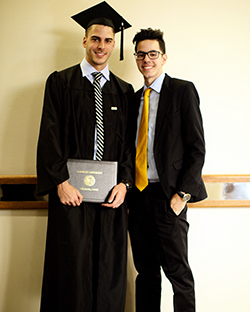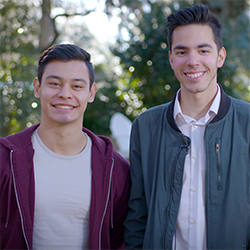When Miguel Viganoni was a child, he was diagnosed with asthma – something that affects nearly 1 in 12 people in the United States. While playing sports, he would experience symptoms such as shortness of breath, a tight and burning sensation in the chest, and palpitations. Miguel managed his asthma enough to continue playing sports, however, that changed when he collapsed during his eighth grade soccer tryouts.
“From that moment on, I was never really able to play sports again competitively,” said Miguel. Following the episode, Miguel learned that he didn’t have asthma, but instead had a cardiac-related issue.
In 2016, Miguel came to Florida State University with his best friend and roommate, D’Angelo Franco. While Miguel’s symptoms persisted, he was able to manage them by sitting down, taking deep breaths and mentally calming himself down. It wasn’t until Miguel’s sophomore year that he had an episode that would change his life forever.
“D’Angelo and I had friends in town visiting and we were going to grab lunch together. We were all at the car when I realized I forgot my wallet,” said Miguel. “I ran upstairs to grab it, and I remember running really fast and started feeling those usual symptoms. And that’s really the last thing I remember.”
It was in that moment that Miguel’s heart stopped beating. His friends who were downstairs had no idea yet what had happened. After a minute or so, D’Angelo decided to go check on him.
“I walked up and went to open the door, but couldn’t open it because it hit something. I kept thinking ‘what am I hitting’ – I couldn’t open it all the way, but I squeezed through and saw him lying there,” said D’Angelo. “I knew right away I had to do something or he was going to die.”
Thankfully, when Miguel and D’Angelo were in high school, they had taken CPR courses. D’Angelo still remembered the procedure and began to perform CPR on his best friend, while simultaneously calling 911 to get help on the way.
D’Angelo was able to keep Miguel alive until EMS arrived. Paramedics used a defibrillator to revive Miguel and transported him to Tallahassee Memorial HealthCare (TMH). William Dixon, IV, MD, FACC, interventional cardiologist at TMH, was working in the cath lab when Miguel was brought in.
 “I had gotten a call from Dr. Giove who told me we had a college student in the emergency room who had cardiac arrest in the field, received defibrillation from EMS, and was now intubated and unresponsive,” said Dr. Dixon. “After several tests, we discovered he had ventricular noncompaction – which means the pumping chamber was formed abnormally, which predisposes him to malignant, life-threatening arrhythmias. But our biggest concern at that moment was his neurologic recovery.”
“I had gotten a call from Dr. Giove who told me we had a college student in the emergency room who had cardiac arrest in the field, received defibrillation from EMS, and was now intubated and unresponsive,” said Dr. Dixon. “After several tests, we discovered he had ventricular noncompaction – which means the pumping chamber was formed abnormally, which predisposes him to malignant, life-threatening arrhythmias. But our biggest concern at that moment was his neurologic recovery.”
TMH is recognized by the American College of Cardiology (ACC) as an “Accredited Chest Pain Center with PCI and Resuscitation.” This designation means that a specialized treatment called percutaneous coronary intervention (PCI) is used as the primary treatment for acute heart attacks, and that the hospital also has a robust hypothermia program for post-cardiac arrest patients who may be at risk of brain damage. This therapeutic hypothermia program, which cools the body to a lower temperature to preserve brain function, was instrumental in Miguel’s recovery.
“Two days later, I was pleasantly surprised – if not shocked – to find out Miguel was awake, extubated, off the ventilator and talking with family,” said Dr. Dixon. “I can’t tell you how happy that made me feel – that here’s this 20-year-old kid who has his whole life ahead of him again.”
Miguel miraculously had no neurological deficits, due in large part to the therapeutic hypothermia, and was discharged after a few days. Because of his diagnosis, Miguel had a permanent defibrillator placed, which monitors his heart rhythm 24/7. In the case of an occurrence of an abnormally fast or dangerous heart rhythm, it is capable of automatically shocking his heart back to normal rhythm.
Since the implantation of the device, Miguel has received those life-saving shocks. However, he has still been able to return to his normal life, but now, with a new outlook on life.
“My life almost ended before I turned 21 years old. Realizing that, it changed my perspective,” said Miguel. “Having a near-death experience like this really makes you appreciate every moment and every day.”

